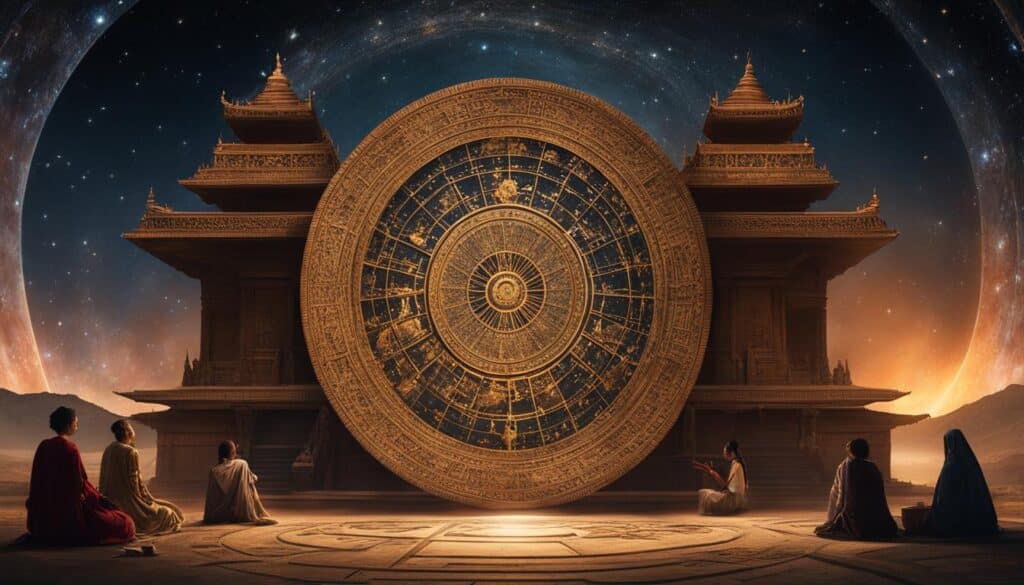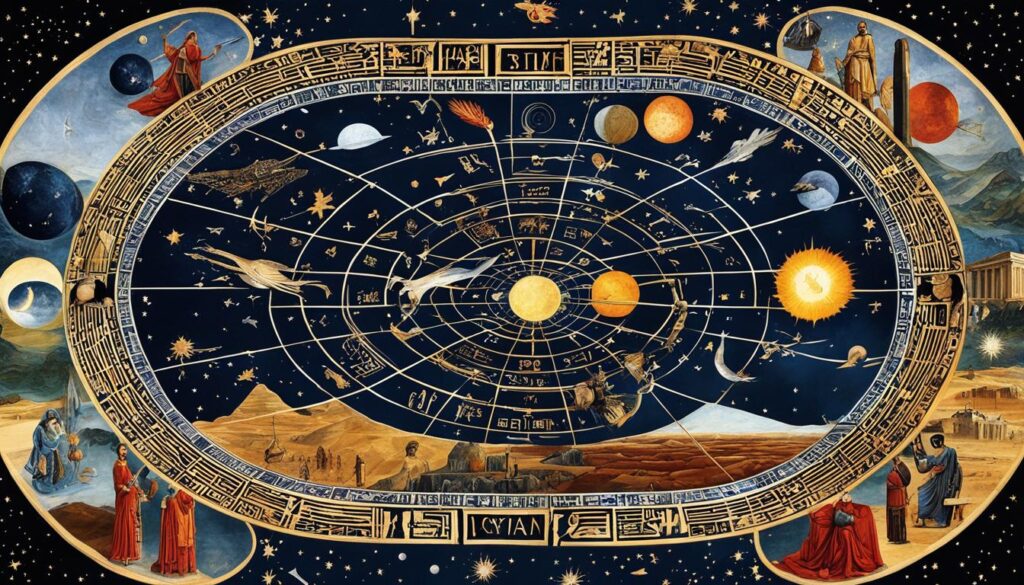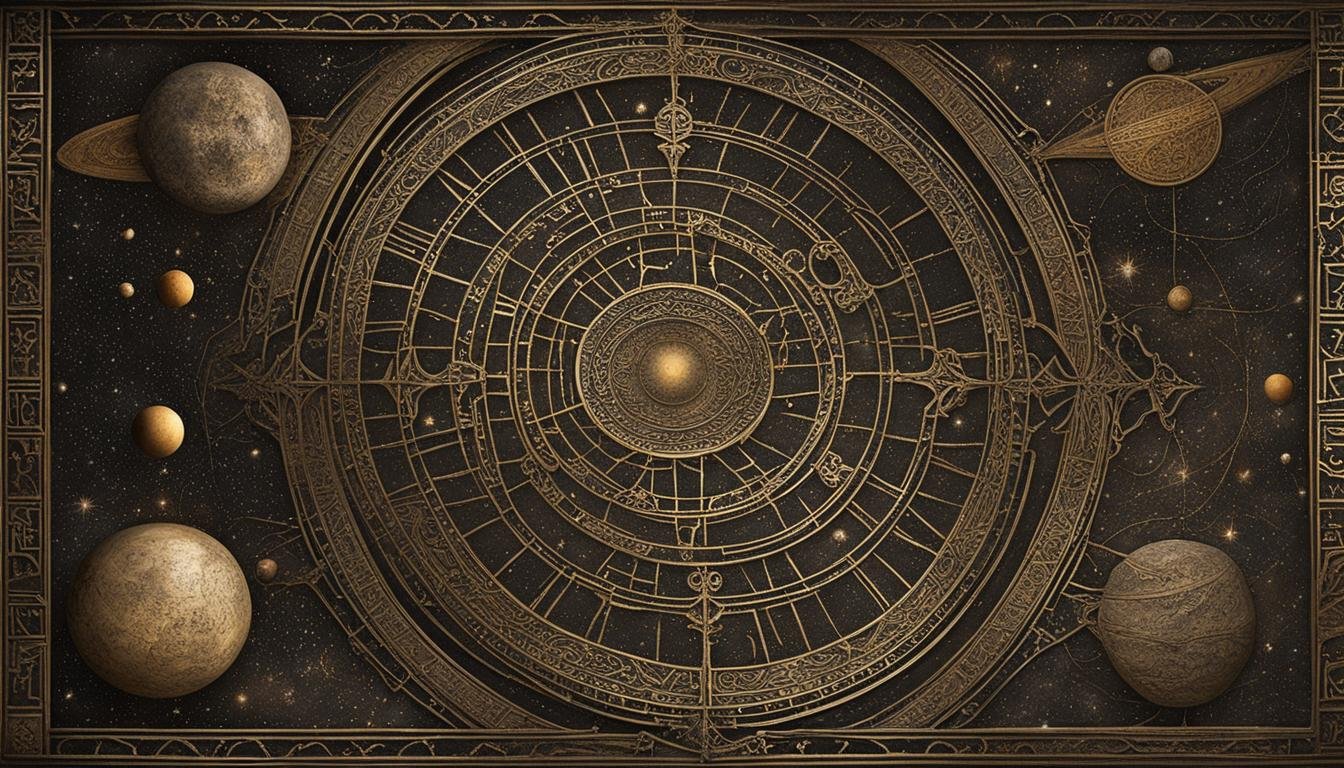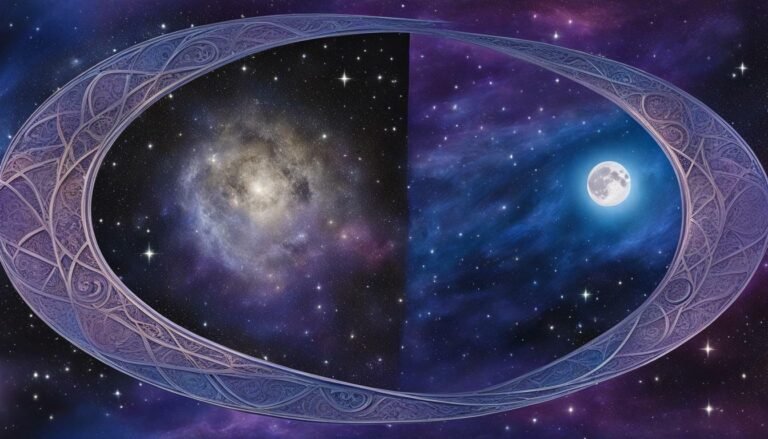When Did Astrology Originate?
Have you ever wondered about the origins of astrology and how this celestial art has woven itself into the fabric of human history? If you’ve looked up at the stars, you’re embarking on a journey that began over thousands of years ago. Trace back the history of astrology and you’ll find that the skies have long served as a canvas for human curiosity and contemplation. Ancient astrology is not merely a footnote in our past; it’s a chapter that elucidates how our ancestors sought understanding and guidance from the cosmos. As you delve into the cosmic chronicles, consider this: when did astrology begin? You’re tapping into an elemental aspect of human culture, a quest that commenced as early as markings on bones and cave art dating back to 25,000 years ago. These were mankind’s initial steps in linking celestial patterns with terrestrial life, a practice that remains deeply intertwined with humanity’s search for meaning in the universe.
Key Takeaways
- The quest for cosmic understanding led to the birth of astrology, with evidence dating back to 25,000 years ago.
- Ancient markings on bones and cave walls indicate that early humans were already tracking lunar cycles.
- Astrology was once a respected scholarly tradition, playing a significant role in political and cultural realms.
- The 17th century saw a critical shift in perception, as emerging scientific concepts challenged astrology’s validity.
- Despite this, astrology enjoyed a resurgence in the 20th century, cementing its place in popular culture.
Tracing Astrology’s Roots to Ancient Times
Embark on a journey to the distant past, where the enigmatic tapestry of astrology’s origins and history unfolds. It’s an adventure that takes you back to when astrology was first practiced, revealing the remarkable contributions of ancient civilizations to a discipline that has captivated humanity for millennia.
The Beginnings of Astrology in Babylonian Civilization
Imagine gazing at the vast Mesopotamian night sky, where Babylonian astrology was born. As early as the 2nd millennium BC, this cradle of civilization was already aligning its societal rhythms with cosmic occurrences. Deep within the annals of astrology’s lush narrative, you’ll find scribes in the service of mighty kings such as Sargon of Akkad meticulously recording celestial patterns. These observations would ultimately cultivate the growth of Babylonian astrology, earmarking it as the progenitor of an organized astrological system.
Babylon’s magnetic influence charted the course for astrology’s evolution. From predicting shifts in weather to determining the fates of empires, the Babylonian astrologers laid the foundational stones upon which horoscopic astrology would arise by the 6th century BC. Their intricate omen-based rituals were not mere acts of divination but a sophisticated synthesis of science, religion, and direct observation of the heavens.
Contributions From Different Cultures to Astrology
Strap in for an odyssey across cultures, where the vibrant mosaics of Hellenistic astrology reveal a melting pot of knowledge. During this era, you’ll witness the fusion of Babylonian expertise with the philosophical prowess of the Greeks, an amalgamation that propelled astrology onto a global stage. It was a period characterized by intellectual expansion and exchange, laying the groundwork for personalized astrological charts and the divination of individual destinies.
The rich tapestry of astrology’s past is dotted with contributions from myriad cultures, each adding a unique stitch to its expansive quilt. As you explore these traditions, you encounter the meticulous methods employed, the shifting interpretations, and the profound impact they have had on shaping the astrology we know today.
- Babylonians charting political and meteorological outcomes.
- Greeks personalizing astrology with the horoscope system.
- Cultures weaving astrology into the very fabric of social, political, and spiritual norms.
Indeed, astrology’s journey through times past is not just a chronicle of stars and planets but also a mirror reflecting human history’s own illustrious saga.
Stars, Planets, and Fate: Early Connections
The emergence of astrology can be traced to an era where the celestial was deeply intertwined with the terrestrial. Imagine gazing up at the Mesopotamian night sky, a canvas of stars igniting your curiosity. Your ancestors sought patterns among these celestial bodies, convinced they held influence over earthly matters. It was during these early periods that astrology’s inception crystallized, leading to a profound association between the heavens and human destiny.
The Babylonians, known for their astute sky-watching, were particularly pivotal in this alliance. They recognized that the stars and planets were more than mere points of light; they were an omen language, a divine script to be deciphered. This understanding led them to develop mundane astrology, centering on the fate of a nation rather than individuals. Legends tell of their omens, indicating the prosperity or downfall of entire kingdoms, based on the movement of planets and the patterns of stars.
This close relationship between the stars and our fate was formalized in the Enuma Anu Enlil, an extensive compilation of approximately 7,000 omens, incorporating both astrology and divination practices. Each symbol spotted in the skies or anomaly found on a sacrificial animal’s entrails held predicted insights. Even today, the legacy of this text is evidence of astrology’s inception, reflecting humanity’s timeless quest to understand its place in the vast universe.
- Integrating Celestial Events with Terrestrial Ventures
- Babylonian Omens and the Enuma Anu Enlil Text
- The Symbolic Language of the Stars in Ancient Times
As you continue to journey through the cosmos, you’ll find that the narrative of astrology is rich with human endeavor and celestial mystery—the stars and planets once seen as living deities that charted our fate. Such is the intriguing backdrop to the powerful link between our ancestors and the cosmic dance above.
Astrology’s Integration Into Social and Cultural Practices
Imagine looking up to the sky and seeing more than just stars—seeing a guidance system that has influenced civilizations for centuries. This is the legacy of ancient astrology, profoundly shaping the social and cultural fabric of societies around the globe. As you delve into history, you’ll find that astrology was even once seamlessly intertwined with the development of many traditional studies including alchemy and medicine.
Influencing Language and Worldviews
Your words and thoughts are subtly interwoven with astrological concepts. From the notion of “Mercurial” personalities to the “Saturnine” temperament, language itself echoes the celestial. This intertwining of astrology and astronomy has been so intrinsic that it’s difficult to envision a world where they once weren’t distinct—one marking spiritual and prophetic influence, and the other, the realm of scientific pursuit.
Predictions and Divine Communications: Astrology’s Role in History
Throughout history, rulers and commoners alike turned their eyes skyward for omens. Kings made decrees while astrologers interpreted the divine will through the movements of planets—it was astrology and science coexisting, guiding fateful decisions and communal activities. Even today, remnants of these practices linger in cultural norms and collective consciousness, a testament to astrology’s engrained role in our shared history.

- Ancient texts reveal how astrological events foretold fortunes of nations and signaled the rise and fall of empires.
- From the planning of crops to the timing of wars, celestial clocks directed the pulse of ancient living.
- The zodiac’s pictographs are not just constellations but archetypes that symbolized traits and destinies.
As you trace the lineage of your own societal customs, remember the celestial threads that have been interwoven through millennia. The stories written in the stars have been, and continue to be, a guiding force for humanity’s quest for understanding the cosmos and our place within it.
The Transition from Astronomy to Astrology
In your journey through the cosmos, you’ve likely pondered the interconnectedness of celestial bodies and human lives. This wonder has been shared throughout the history of astrology, an epochal tale that harkens back to ancient times. Astrology’s integration into human society began when there was no separation between the celestial observations of astronomy and the interpretive art of astrology.
Picture this: an era where charting the stars and divining fate were simply two pages of the same book. In these early civilizations, the celestial sphere was a canvas on which stories of gods, men, and the fates were intertwined. As the Enlightenment blossomed, however, a profound shift occurred, cleaving the once conjoined practices into distinct camps.
Taking a page from Newtonian physics, the scientific community began to favor empirical evidence—a shift that saw astrology’s grand narratives of human destiny being gently nudged aside for the precision and predictability that ruled the natural sciences. Yet, despite this parting of ways, the allure of astrology endured.
- **Astrology’s Tenacity:** Despite being labeled unscientific, astrology maintained its grip on culture, continuing to inspire, console, and guide those who looked heavenward.
- **Cultural Mainstay:** The enigmatic symbols and the zodiac retain their magnetism, etching astrology into the cultural zeitgeist across centuries.
- **Enduring Legacy:** The stories woven from the tapestry of the stars resonate ever so strongly in today’s world, reminding us of our shared history with the cosmos.
In essence, the transition from astronomy to astrology is not simply a tale of separation but a narrative of enduring wonder—a testament to how the night sky has continued to shape our contemplation of our place in the universe.
Unveiling the Timeline: When Did Astrology Begin?
Embarking on a journey back in time, you may wonder about the origins of astrology and its pivotal role in human history. The answer to when did astrology begin ushers us into a world where the sky served as humanity’s first grand calendar and alarm system.
The Earliest Evidence of Astrological Practice
The quest to understand celestial patterns led to the birth of astrology, with the most archaic evidence etched upon cave walls and preserved on etched bones. These ancient artifacts serve as testimonials of how our ancestors used lunar cycles for crucial survival strategies—deciding when to hunt, plant, or migrate.
Astrology’s Evolution: From Observing to Forecasting
Moving forward from mere observation, the early astrologers of Mesopotamia made leaps in abstract thinking to forecast earthly events, laying the groundwork for what would become sophisticated systems of divination. This cognitive leap transformed astrology into a structured practice, capable of foreshadowing one’s destiny, as it streamed through Babylonian civilization and beyond.
As you gaze up at the heavens on a star-filled night, know that you’re partaking in a timeless human tradition, where the stars were once maps to our ancestors—a tradition that has, since its dawn, evolved to narrate the human experience in cosmic terms.
Significant Astrological Traditions and Systems
As you delve into the fascinating world of astrology, it’s essential to understand the rich history and variety of astrology systems that have developed over millennia. These traditions, from the ancient to the complex, have all contributed to the astrology we’re familiar with today.

The influence of Babylonian astrology and Hellenistic astrology is undeniable, establishing the foundation for astrology traditions that have continued to evolve over the centuries.
Babylonian and Hellenistic Influences
Babylonian astrology’s legacy began with meticulous records of celestial movements, creating a systematic approach to interpreting the cosmos. Astoundingly, astrology’s organized system, which we’re a part of today, owes much of its structure to these ancient astrologers who first divided the zodiac into the 12 equal segments.
Hellenistic astrology further refined these concepts after Alexander the Great’s expeditions bridged diverse cultures. Hellenistic thinkers amalgamated Babylonian astrological knowledge with Egyptian traditions, creating a synthesis that would dominate Western astrology for centuries.
Eastern Astrology: Chinese and Hindu Variations
Not left behind, Eastern astrology presents a divergent yet equally mesmerizing perspective. Chinese astrology, deeply rooted in traditional Chinese philosophy and cosmology, used astrological signifiers to advise emperors and forecast imperial fortunes. Similarly, the Hindu or Vedic astrology of India provides a unique sidereal zodiac system, which aligns with fixed star constellations, differing from the tropical zodiac used in Western traditions.
These various astrology systems reflect humanity’s enduring quest to understand our relationship to the universe and each other. Your personal journey through astrology’s traditions may reveal a cosmological connection that reaches back through civilizations and ages, manifesting the timeless human fascination with the stars.
Icons of the Zodiac: Understanding Astrological Signs
Delving into the mysteries of the zodiac, you’ll discover a symbolic language that has echoed through time, from the ancient riverbanks of Babylon to the philosophical halls of Hellenistic Greece. These astrological signs hold more than just mythological tales; they are cornerstone elements of astrological tradition, representing the fusion of celestial patterns with human experiences.
The Zodiac’s Babylonian and Hellenistic Roots
The journey of the zodiac signs began with Babylonian astrology, where meticulous celestial observations led to the creation of an organized zodiacal system. The Babylonians were the pioneers in assigning equal parts to the signs, a methodical approach that laid the foundation for decoding the heavens. It was during the Hellenistic period, however, that the zodiac truly came to life, with each constellation being bestowed a name, persona, and place in the cycle of time—thanks to Hellenistic astrology’s rich tradition.
Constellations and Calendars: Astrology’s Approach to Time
Zodiac signs are not only markers in the celestial sphere but also serve as chronological guides in astrology’s calendar. As the Earth orbits the sun, each sign signals the coming of a new season, a change in weather, or an agricultural milestone. By mapping the constellations to a calendar, astrologers were able to interpret time through an astrological lens, recognizing that each period brought unique cosmic influences upon the world below.
- Aries heralds the spring equinox, a time of rebirth and new beginnings.
- Libra brings the balance of the fall equinox, symbolizing harmony and reflection.
- Capricorn marks the winter solstice, a period for introspection and resolution.
- Cancer ushers in the summer solstice, celebrating vitality and abundance.
In the dance of the cosmos, these astrological signs form a celestial tapestry that narrates our collective journey under the stars. Whether you look to the sky seeking guidance, or merely to appreciate the vastness of the ancient astrologers’ legacy, the zodiac offers a unique blend of history, science, and mythology.
Scientific Scrutiny and the Fall of Traditional Astrology
As you delve deeper into the cosmos of astrology and science, you’ll find a tumultuous history beset by scientific scrutiny of astrology. For centuries, astrology held a spot as an esteemed scholarly subject, only to be drawn into the crossfires of rigorous scientific methods. The core of modern contention began with the dawn of empirical evidence that challenged and eventually repudiated astrological precepts—seminal discoveries that significantly altered humanity’s understanding of the cosmos, such as Copernicus’s heliocentric model, severing astrology’s ties with academia.
- Empirical Methods and Lack of Evidence: With the rise of empirical science came the dispassionate eye of the scientific method, which demands rigorous evidence. Astrological claims, lacking such evidence, came under fire from the scientific community.
- The Shift in Celestial Understanding: Heliocentrism was a radical idea that changed everything. No longer was Earth the unmoving center of the universe—an assumption underlying much of astrology.
- From Mainstream to Fringe: Once sharing the stage with established sciences, astrology found itself relegated to the sidelines as a pseudoscience in many academic circles.
Despite the skepticism, astrology endures, retaining its mystical allure. As the celestial bodies continue their indifferent dance against the tapestry of the night sky, so too does human curiosity persist—ever seeking patterns and meanings, whether grounded in science or not. You encounter astrology spanning beyond strict scientific validation, thriving in the cultural imagination as an enexhaustible source of fascination.
Conclusion
As we gaze upon the tapestry of the skies, your fascination with astrology is as persistent as the twinkling constellations that fuel it. The practice, emerging from the shadows of prehistoric caves and ancient Babylonian temples, has withstood the rigorous scrutiny and paradigm shifts prompted by the Enlightenment. The resilience of astrology’s allure is a testament to its profound significance throughout the history of human civilization. Even as science has revolutionized our understanding of the universe, the seductive promise of understanding one’s destiny through the stars remains timeless.
The Unbroken Fascination with Astrology Through Ages
Your interest in the celestial narrative is rooted in astrology’s unbroken fascination that has persisted through every epoch, guiding empires and kindling the imaginations of seekers and scholars alike. From the banks of the Euphrates to the digital streams of social media, the essence of astrology continues to capture the collective curiosity with its omnipresent appeal. The quest for celestial wisdom—a bridge between the ancient and the avant-garde—is as enduring as the galaxies that dance above us.
Rekindling the Astrological Tradition in Modern Times
In modern times, astrology experiences a renaissance, its principles echoing in the hearts of the new generation desiring to unlock the mysteries of their personal narratives through planetary dialogues. This rekindling of astrology, across platforms from print to pixel, symbolizes not only a revival but an evolution—adapting to your contemporary lives while maintaining its cosmic core. The continual rediscovery and reinterpretation of these celestial symbols underscore a profound connection between human experience and the vast, unknowable cosmos that engulfs it, ensuring astrology’s place in both your culture and curiosity.
FAQ
When did astrology originate?
Astrology’s origins can be traced back to at least the third millennium BC among West Eurasian people, with some indications of humans tracking lunar cycles as far back as 25,000 years ago.
What are the beginnings of astrology in Babylonian civilization?
The organized system of astrology began in Babylon, evolving significantly around the 2nd millennium BC. Babylonians developed an omen-based astrology system by the 16th century BC.
How did different cultures contribute to astrology?
Various civilizations, each with their own astronomical knowledge, contributed to the development of astrology. Babylonian and Hellenistic cultures provided foundational principles, and other traditions such as Chinese and Hindu astrology brought unique perspectives to the practice.
How did astrology emerge?
Astrology first emerged as humans made connections between earthly events and the celestial sphere, with early astrology focused on predicting seasonal shifts and major events based on astronomical observations.
How was astrology integrated into social and cultural practices?
Astrology influenced language, worldview, and was pivotal in decision-making. Kings and leaders relied on astrological predictions, and communal activities were planned according to celestial events.
What is the difference between astrology and astronomy?
Astronomy is the scientific study of celestial bodies, whereas astrology is a belief system that interprets the positions of these bodies as influencing human affairs and natural phenomena. Until the 17th century, the two were largely undifferentiated.
What is the earliest evidence of astrological practice?
The earliest evidence includes cave paintings and bone markings from 25,000 years ago, which show that ancient peoples tracked lunar cycles and related celestial events to their daily lives.
How has astrology evolved from observing to forecasting?
Over time, astrology developed from simple celestial tracking for survival purposes to forecasting (horoscopic astrology). By the 6th century BC, Babylonians used detailed charts to predict individual fates and natural events.
What are the significant astrological traditions and systems?
Babylonian astrology, which is the bedrock of Western astrology, Hellenistic astrology, which gave rise to the zodiac, and Eastern traditions such as Chinese and Hindu astrology, all represent significant systems that have shaped the practice.
What are the Babylonian and Hellenistic influences on astrological signs?
The Babylonians established the zodiac’s twelve equal sectors, while the Hellenistic period named the constellations and tied them to specific times of the year, formalizing the system used by many Western astrologers today.
How did astrology approach the concept of time with constellations and calendars?
Astrology used the positions of constellations to organize a calendar system, marking seasons and important yearly events to help societies plan agricultural and spiritual activities.
What has been the scientific scrutiny of astrology?
Scientists have critiqued astrology for lacking empirical evidence to support its predictions. The shift towards a heliocentric understanding of the universe during the Enlightenment further distanced astrology from science.
What sustains astrology’s unbroken fascination through the ages?
Despite scientific scrutiny, astrology’s ability to provide a sense of meaning, control, and connection with the cosmos continues to fascinate people, sustaining its presence across cultures and time.
How is the astrological tradition being rekindled in modern times?
Today’s astrological tradition thrives through media such as horoscopes in newspapers and online platforms, enabling modern audiences to engage with astrology as a form of personal insight and entertainment.







